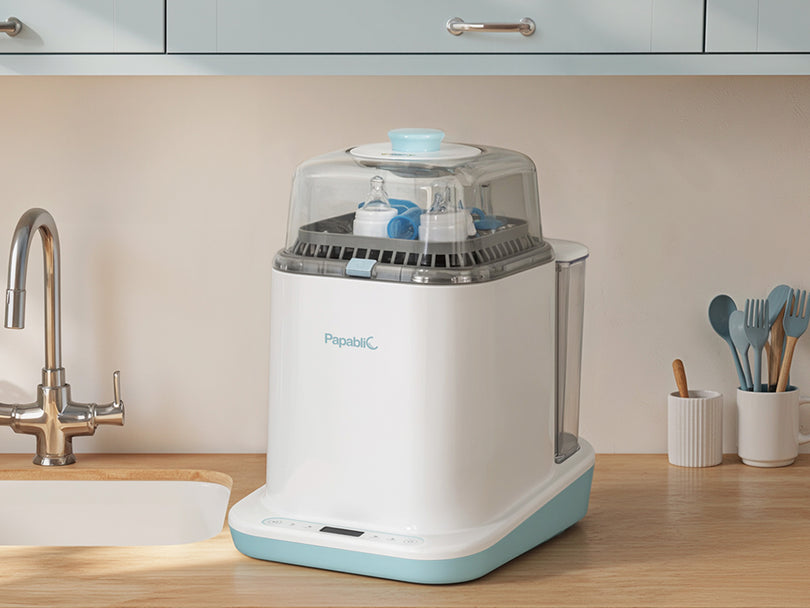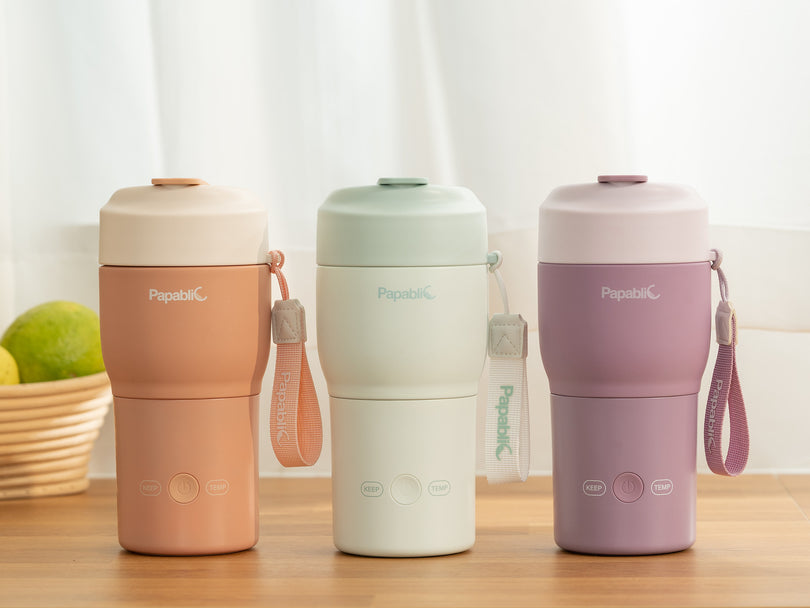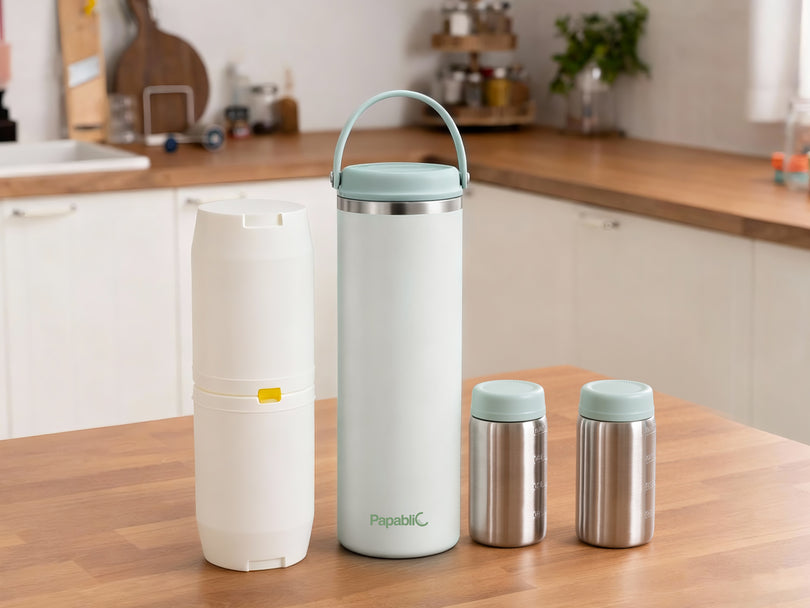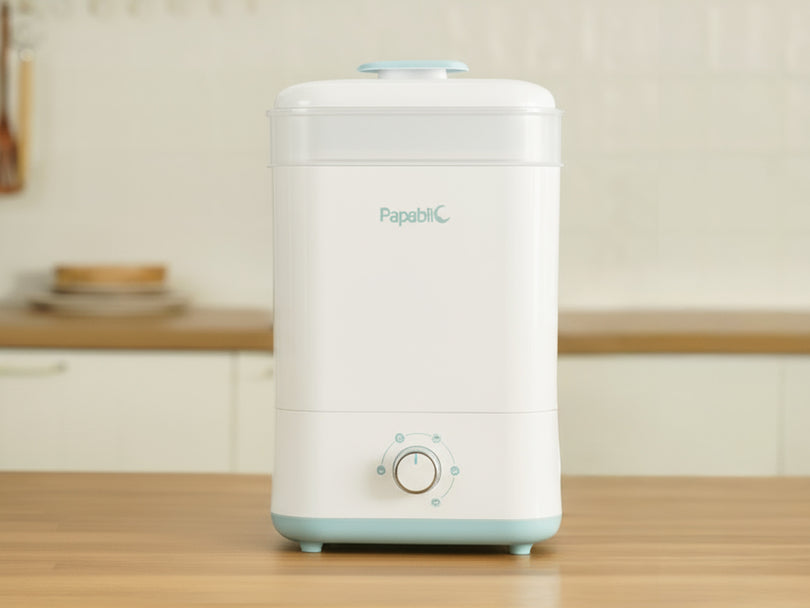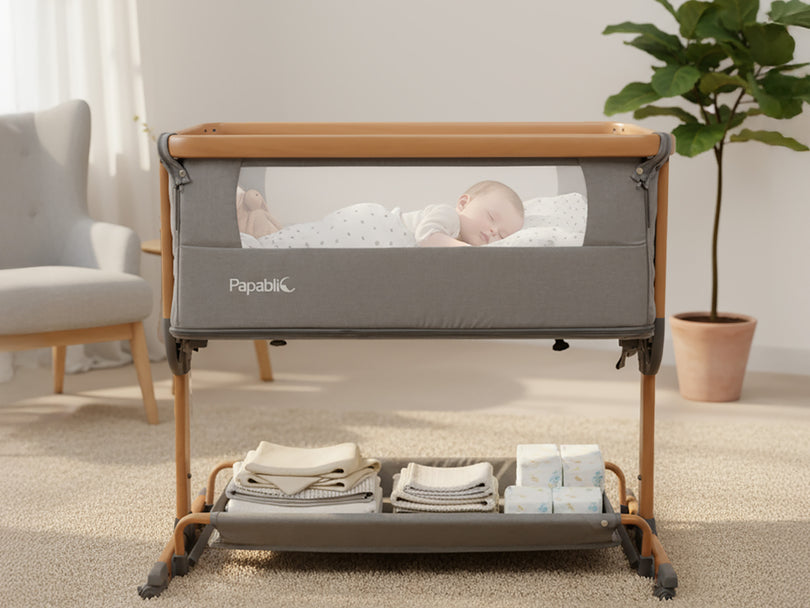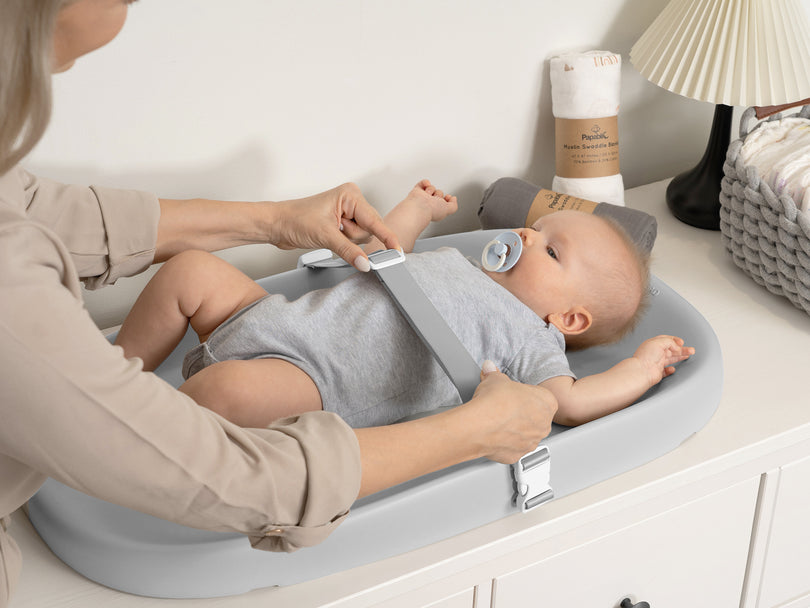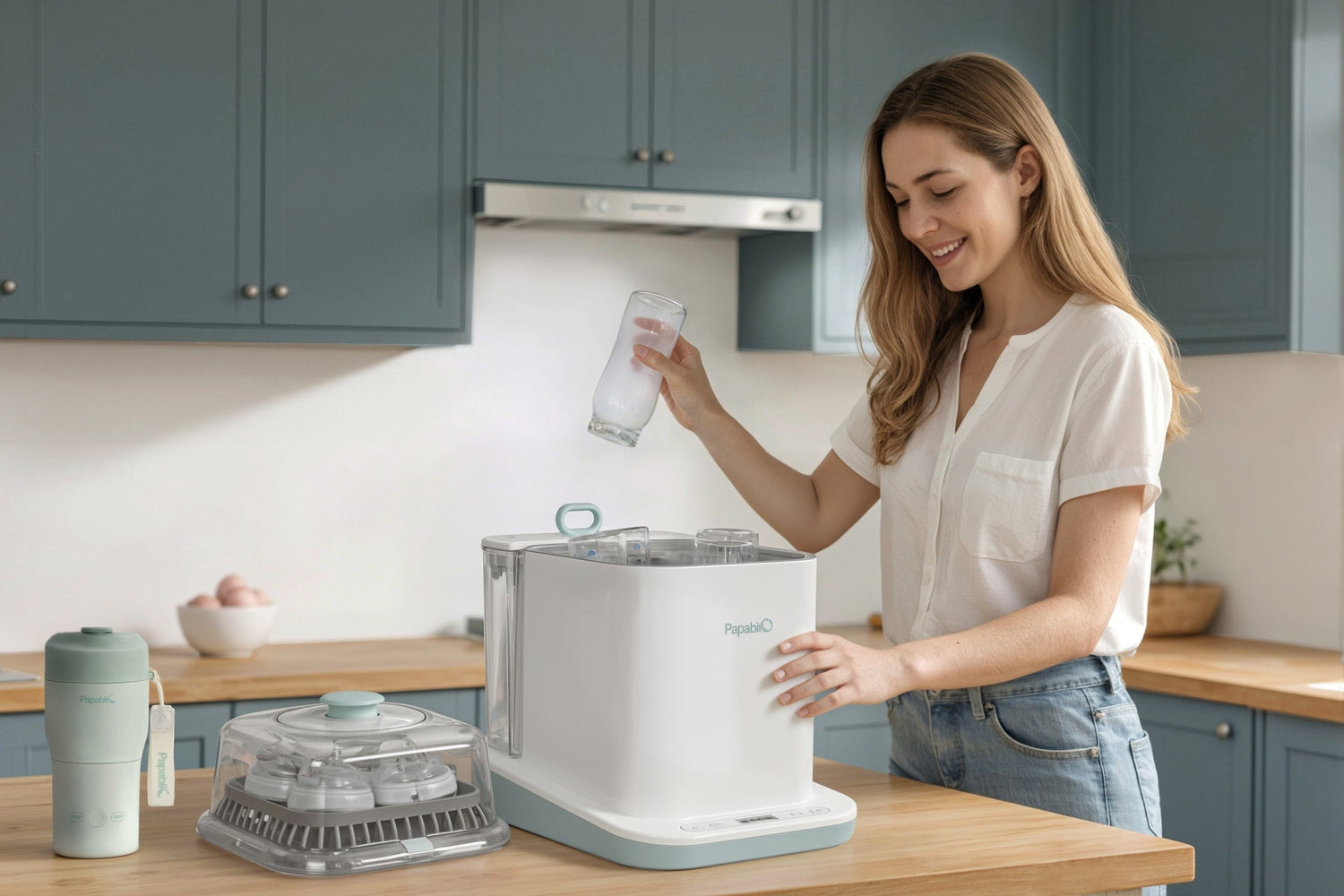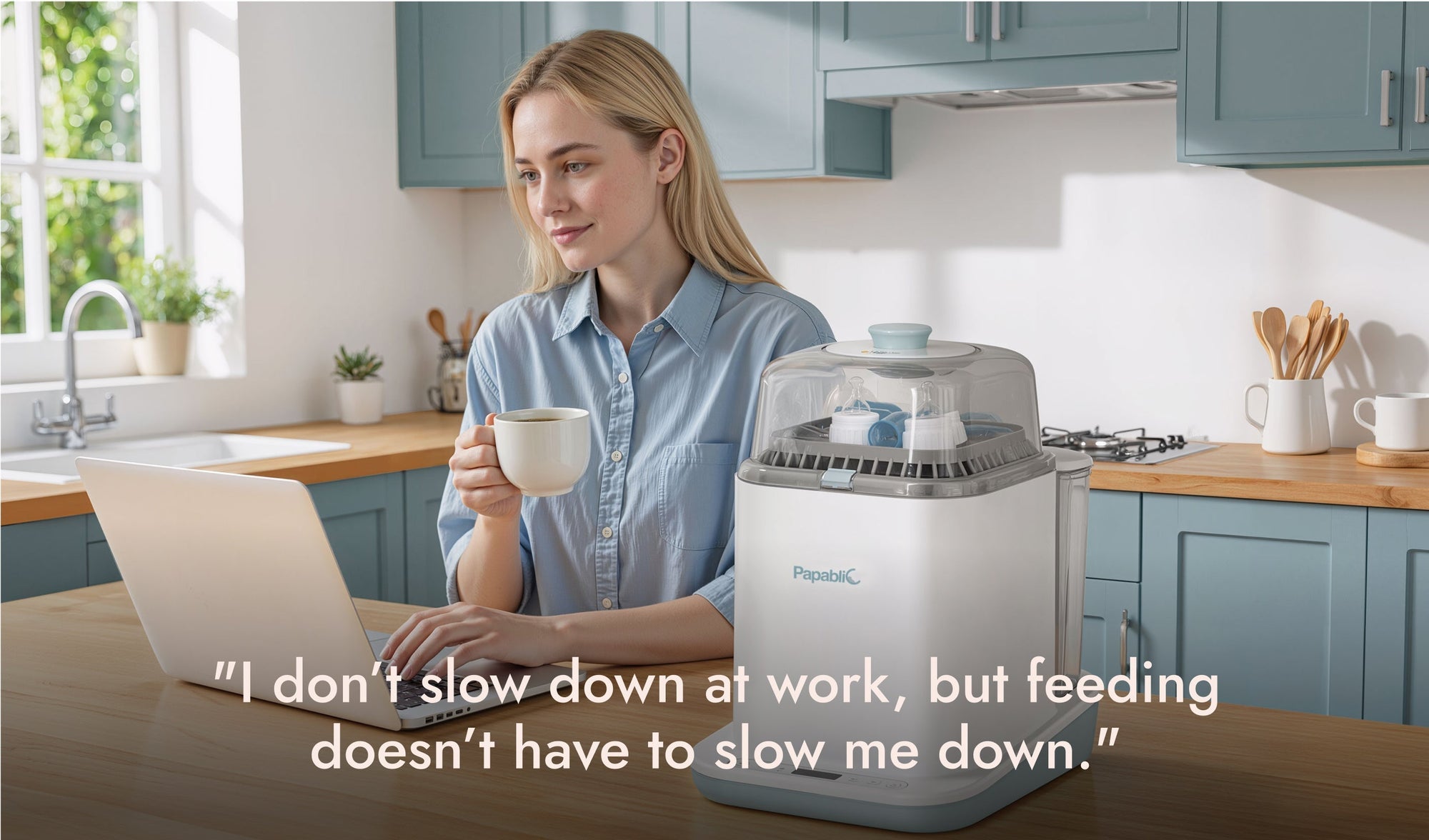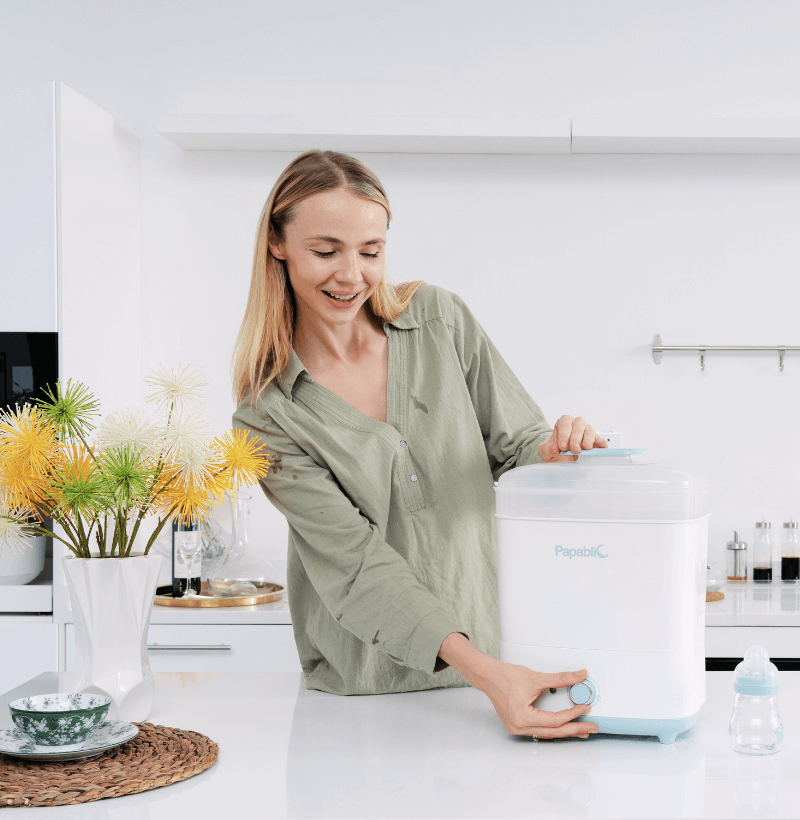For newborns, cleanliness isn’t just a preference—it’s a necessity. Anything that goes into your baby’s mouth, including bottles, pacifiers, and other baby products must be properly cleaned and sanitized to avoid potential issues like bacterial infections, tummy troubles, or weakened immunity.
That’s why many parents are paying more attention to how they clean baby bottles. One question that’s often discussed is: should you use a regular dishwasher, or invest in a professional bottle washer? For moms, understanding the difference between the two options is key to making the right choice for your baby’s health and your own peace of mind.
What is Bottle Washer
A bottle washer is a specialized device designed for cleaning baby bottles, nipples, and accessories. Most modern bottle warmer sterilizers combine three functions in one unit: washing, sterilizing, and drying.
Like Papablic Baby Bottle Washer. They are typically used with fully automatic cleaning and drying, ensuring that every part of the bottle is cleaned and sanitized effectively.
What is Dishwasher
A dishwasher is a common kitchen appliance primarily used to clean cookware and tableware. Most modern dishwashers use high temperatures to disinfect and remove bacteria.
While some dishwashers include a baby care mode or high-temperature rinse cycle, they still fall short compared to a professional baby bottle washer, which is specifically designed for the unique shapes and cleaning needs of baby bottles.
What are the differences between bottle washer and dishwasher?
While both appliances are designed for cleaning and serve user needs, there are several key differences between a professional bottle washer and a standard dishwasher.
Professional adaptability
Bottle washers are designed specifically for baby products, with racks and attachments that hold bottles, nipples, and pacifiers in place.
Dishwashers are designed for a wide range of kitchenware, offering greater versatility for household cleaning tasks.
Cleaning principle
Bottle washers use gentle, high-pressure jets and rotating spray arms designed to reach deep inside bottles. They are optimized for removing formula or breast milk residue.
Dishwashers rely on high temperatures and intensive wash cycles to tackle food particles, grease, and sauces commonly found on cookware and tableware. Their cleaning mechanism is suited for general kitchen messes.
Floor space
Bottle washers are typically compact and portable, making them ideal for use in nurseries, bedrooms, or small kitchens.
Dishwashers are built-in or countertop appliances that require more space and permanent installation.
Disinfection capability
High-quality bottle washers often include built-in UV sterilization or high-temperature steam, which meets or exceeds hygiene standards for infant feeding.
Dishwashers use high-temperature rinse cycles that disinfect general kitchenware but may not be as effective for delicate baby bottles.
Smell Transfer
Bottle washers are designed to focus exclusively on cleaning baby products, preventing cross-contamination and odor transfer from other items.
Dishwashers can sometimes leave a lingering smell on bottles, especially if they are washed alongside other kitchenware. Babies may not want to drink from bottles that carry this scent, which can be a concern for picky feeders.
Water Consumption
Bottle washers are more water-efficient, specifically designed to clean baby bottles without wasting unnecessary water, making them a more eco-friendly choice for families with babies.
Dishwashers generally use more water per cycle, especially when washing a full load of kitchenware. This can be inefficient when cleaning just a few baby bottles.
For moms and babies, a dedicated bottle washer is recommended because it cleans and sterilizes baby products more thoroughly and gently than a dishwasher. Its design ensures better hygiene and safety for delicate items like bottles and nipples. Dishwashers are versatile but may not meet the specific needs of infant feeding gear.

How to choose a professional bottle washing product
Choosing the right bottle washer is essential to ensure your baby’s feeding items are thoroughly cleaned, sanitized, and safe.
Here’s what to look for in a professional bottle washing product.
Designed specifically for baby products
Make sure the appliance is tailored for bottle shapes, pacifiers, pump parts, and other baby items. Special racks and bottle holders ensure complete cleaning.
Three-in-one smart system
A good bottle washer should offer cleaning, sterilization, and drying in one device to reduce time and prevent cross-contamination.
Easy operation
With fully automatic cleaning and drying, spend less time worrying and more time cherishing precious moments with your little one.
Safe material
Ensure the machine is made from BPA-free, food-grade materials that are heat resistant and baby-safe.
Brand and after-sales service
Go for reputable brands known for product quality, positive customer feedback, and reliable after-sales support.
Best Bottle Washer Brands Recommended
Papabli Baby Bottle Washer Sterilizer and Dryer All in One Bottle Cleaner is a product designed specifically for babies, combining the features of the best bottle sterilizer and a baby bottle warmer into one convenient, easy to use unit.
It offers the following advantages:
All-in-One Care
Wash, sanitize, dry, and store – offering everything you need to keep your baby’s essentials clean and safe, all in one place.
More Time for What Matters
With fully automatic cleaning and drying, spend less time worrying and more time cherishing precious moments with your little one.
Deep, Reliable Clean
Our powerful spray system, featuring 26 water outlets and high-pressure jets at 25,000Pa, ensures a thorough wash at 162℉, reaching every corner for complete peace of mind.
Designed to Fit Your Life
Whether it’s baby bottles or breast pump accessories, it adapts to your needs with its versatile design.
Effortless Convenience
Compact yet spacious, it fits perfectly in any kitchen and requires no installation. The easy-to-use control panel makes caring for your baby’s essentials a breeze.

How to maintain bottle washer daily
Proper daily maintenance of your bottle washer is essential to keep it running efficiently and ensure your baby’s feeding items stay hygienic.
1. Empty and rinse the machine after each use to prevent residue buildup.
2. Wipe down the interior and exterior with a clean, damp cloth regularly.
3. Check and clean filters or water inlets weekly to avoid clogging.
4. Use recommended cleaning agents or vinegar solutions monthly to descale and sanitize. Use a professional cleaning agent like Papablic Official DeepClean Detergent Tablets to ensure thorough and safe cleaning of your baby bottles.
5. Leave the door open after use to let it air dry and prevent mold or odors.
Other Points for Baby feeding
Keeping your baby’s feeding safe and hygienic involves more than just cleaning bottles. Following these tips helps protect your baby and makes feeding easier for both of you.
1. Always test the temperature of warmed milk before feeding to avoid burns.
2. Use fresh or properly stored milk to ensure safety and nutrition.
3. Sterilize bottles and nipples regularly, especially for newborns under 6 months.
4. Follow feeding schedules recommended by pediatricians but be flexible to your baby’s needs.
5. Maintain clean hands and feeding area to reduce contamination risk.
FAQs
Q1: How many bottles can be washed? Is it suitable for families with multiple babies?
Most mid-sized bottle washers can handle 4 bottles per cycle. They are great for families with twins or multiple young children.However, Papablic can wash up to 8 bottles per cycle, making it an ideal choice for larger families.
Q2: Do you have to use a washer, sterilizer and dryer after each use of the bottle?
For newborns and infants under 6 months, it’s highly recommended to wash and sterilize bottles after each use. Older babies may not require sterilization every time.
Q3: Can the washer, sterilizer and dryer be used to clean other baby products?
Yes.Whether it’s baby bottles or breast pump accessories, it adapts to your needs with its versatile design.
Q4: Does the washer, sterilizer and dryer consume a lot of electricity?
Modern bottle washers are energy-efficient. A full cycle typically uses around 0.3 to 0.5 kWh—very economical for daily use.
Conclusion
While dishwashers offer general convenience, they often fall short when it comes to the specialized cleaning baby products require. Bottle washers provide targeted cleaning, effective sterilization, and smart features that are designed with infant safety in mind. For parents looking to ensure the highest hygiene standards for their baby, investing in a professional bottle washer is a wise and worthwhile choice.
Read more:
Best Practices for Warming Breast Milk: Everything You Need to Know
How to Choose the Right Bottle Sterilizer
How to Travel with a Baby: Essential Tips for Stress-Free Trips

